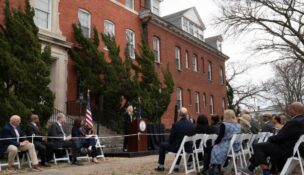Whistleblowers amend complaint against Sentara
Plaintiffs recruit new legal team in case over insurance rates
Josh Janney //September 29, 2025//

Sentara Health, which operates Sentara Martha Jefferson Hospital in Albemarle County, is at the center of a complaint over how the Hampton Roads-based health care system’s former Optima Health subsidiary set insurance rates in Charlottesville for the Affordable Care Act market in 2018 and 2019. Photo courtesy Sentara Health

Sentara Health, which operates Sentara Martha Jefferson Hospital in Albemarle County, is at the center of a complaint over how the Hampton Roads-based health care system’s former Optima Health subsidiary set insurance rates in Charlottesville for the Affordable Care Act market in 2018 and 2019. Photo courtesy Sentara Health
Whistleblowers amend complaint against Sentara
Plaintiffs recruit new legal team in case over insurance rates
Josh Janney //September 29, 2025//
A long-running whistleblower case against Sentara Health has entered a new phase, with the plaintiffs filing an amended complaint and recruiting additional lawyers to continue pursuing their allegations that the Hampton Roads health system improperly inflated health insurance premiums in 2018 and 2019.
Last week’s court filing came about three months after the U.S. Department of Justice (DOJ) withdrew from intervening in the case in June, a move that a legal expert has said may make the whistleblowers’ task more difficult.
The whistleblower plaintiffs — Charlottesville residents Sara Stovall, Ian Dixon and Karl Quist — submitted an amended complaint on Sept. 23, to the U.S. District Court for the Western District of Virginia.
While the plaintiffs are retaining their previous attorney, Marty Bienstock, they’ve added Rick Mountcastle from Guttman Buschner and several attorneys from law firms Reese Marketos and Berger Montague to the roster.
Earlier this year, Reese Marketos and Berger Montague secured a $1.6 billion False Claims Act judgment against Janssen Products, a subsidiary of Johnson & Johnson, in a case involving allegations that Janssen engaged in unlawful marketing practices for HIV medications.
“Ian, Karl and I are absolutely thrilled that our False Claims Act case is in the expert hands of the most successful, reputable law firms in the country,” said Stovall. “We are as confident as ever that the facts are on our side, that what we allege is true, and that Sentara owes a large amount of money back to the taxpayers.”
Dixon, Quist and Stovall’s complaint alleges that Sentara’s Optima Health insurance division (now part of Sentara Health Plans) significantly raised rates for 2018 and 2019 health insurance coverage in the Charlottesville region under the federal Affordable Care Act. At the time, Sentara was the only insurer offering health coverage on the ACA exchange in the region.
Sentara, in court filings and public statements, has consistently denied all the plaintiffs’ allegations and has said the company was being a good corporate citizen that stepped up during a politically volatile time to prevent vulnerable Virginians from losing health insurance coverage.
“At a time when Virginians were at risk of losing access to ACA coverage, Sentara worked with government leaders to meet the needs of Virginians, quickly expanding coverage and supporting the health of our communities,” Sentara spokesperson Dale Gauding said in a statement. “The Department of Justice thoroughly reviewed the case and ultimately declined to intervene, reaffirming what we’ve said from the beginning: The facts and the evidence are on our side. It’s unfortunate that the [plaintiffs] in this case have misconstrued the facts in an effort to win financial gains.”
Sentara, he added, “will continue to vigorously defend against these meritless allegations while remaining fully focused on our not-for-profit mission: improving health and access to care across the commonwealth.”
The plaintiffs’ initial complaint, filed in 2020, sought more than $200 million in damages and civil penalties on behalf of the U.S. government from Sentara, Optima and Seattle-based independent actuarial and consulting firm Milliman, which certified Optima’s insurance rates.
However, the amended complaint no longer specifies $200 million in damages but alleges that the defendants engaged in practices that “caused hundreds of millions of dollars in damages to the United States” and asks the court for treble damages and applicable civil penalties in the maximum amount allowed by law.
“We’re not a big firm, but we’ve taken and had some great success on some [False Claims Act] cases,” said Adam Sanderson, one of the plaintiffs’ new attorneys from Reese Marketos.
Regarding the Sentara case, Sanderson said, “We feel great about the evidence that we have available to us, and we feel great about the evidence we’re going to be able to discover during the course of this case.”
Roanoke attorney John P. Fishwick, a former U.S. attorney for the Western District of Virginia and oft-quoted legal commentator, said, “The plaintiffs have a strengthened legal team and I would expect them to move forward with alacrity. It does not help if DOJ withdraws from a case, but the plaintiffs have sent a signal they are committed to the case.”
While it’s too soon to predict what will happen, Fishwick said, “you can expect many legal motions by each side. A trial is a long way off.”
P

















